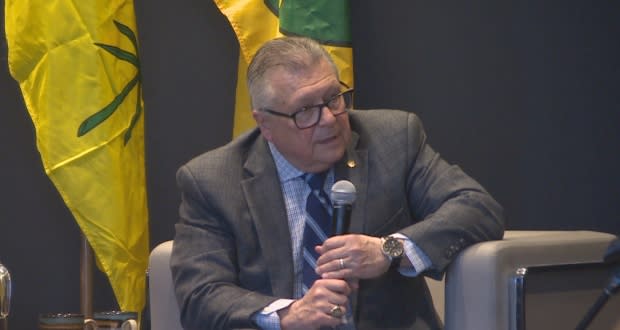Federal, provincial elections targets for cyberattacks, Goodale warns during lecture at U of Regina
The internet is valuable, but increasingly has the potential to cause "enormous harm," Canada's public safety minister says.
Ralph Goodale said during a Tuesday lecture at the College Avenue campus of the University of Regina that with Canadians spending more time online than people in any other country, cyberattacks are "not a hypothetical problem."
"Our most sensitive personal and financial information is quite literally floating in a cloud," he said during the lecture, titled National Security Tools and Architecture for a Changing and Difficult World.
"Millions of times every day, hackers at home and around the world are trying to break in."
Elections will be the next targets, the Regina-Wascana MP said.
Misleading ads, troll farms and bots were deployed from foreign countries on social media during the last American presidential election, in an effort to sway voters.
"It's all fair game for Canadian political parties to wrestle with each other and have some of the fiercest arguments they can have, that's fine," said Goodale.
He said his ministry is now in talks with Canada's largest internet service providers, hoping to convince them to take a closer look at the content they may inadvertently be disseminating.
"When it's being manipulated from some foreign capital, Canadians need to know," Goodale said.
'Look at what your source is': chief electoral officer
Michael Boda, Saskatchewan's chief electoral officer, said his office is upgrading its information technology systems, which include the province's permanent voter registry.
He said it's possible his office may also run ads, warning voters to be skeptical about the source of articles and comments on social media sites.
Boda said he will not hesitate to correct misleading election information online.
"Our responsibility would be to very quickly correct that," he said. "And we would educate our voters with respect to what it means to look at what your source is."

Boda also said Saskatchewan will still rely on paper ballots in its next provincial election, with tabulating machines being used to count votes from advance polls.
His office plans to hold information meetings over the coming year with Saskatchewan's six registered political parties, warning them to take extra precautions to safeguard their online networks and data.
'More vulnerabilties than ever before'
Recent federal legislation also aims to curb foreign interference in Canadian elections, Goodale said Tuesday.
Bill C-76 — which included reforms to Canada's elections laws and recevied royal assent last month — will stop third parties from engaging in partisan activities using money from other countries, he said.
The bill also means anyone selling advertising space must not knowingly accept election ads from foreign groups.
"Canadians need to become more alert and skeptical about fake news masquerading as real information, especially on social media," Goodale said.
"An increasing concern are groups of right-wing white supremacists and neo-Nazis, who foment hate," he said.
Beyond misinformation, there's also concern around hackers, who can tamper with any internet-linked system, says University of Ontario Institute of Technology associate professor Steven Downing.
He cited ransomware attacks on more than a dozen British hospitals last year as evidence.
"The hospitals were using outdated operating systems with outdated security protocols," said Downing.
"Technology is creating more vulnerabilties than ever before."

